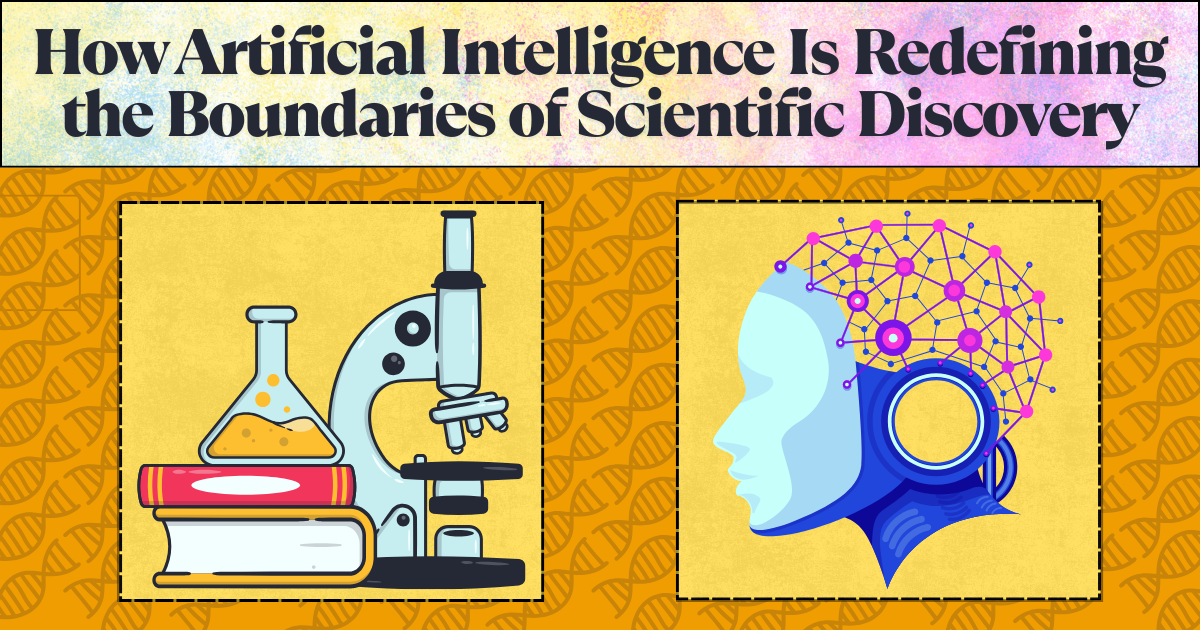How Artificial Intelligence Is Redefining the Boundaries of Scientific Discovery. Artificial Intelligence (AI) plays a crucial role in science and its discoveries. AI has transformed the science research that is conducted across every field, from biology to physics. With the help of AI, scientists are able to research everything in depth and quickly. To know more about the topic “How Artificial Intelligence Is Redefining the Boundaries of Scientific Discovery,” read the complete topic.
How Artificial Intelligence Is Redefining the Boundaries of Scientific Discovery
Artificial Intelligence (AI) has boosted the speed and depth of scientific discoveries. The rapid evolution of AI is redefining biomedicine, placing itself at the forefront of groundbreaking discoveries in molecular biology, genomics, drug discovery, diagnostics, and beyond. AI has evolved and is still evolving, which is very beneficial to science and scientists. AI’s transformative impact has been widely known, with its ability to improve accuracy and productivity driving advancements across various sectors of biotechnology.

AI is capable of performing highly complex computations with high accuracy and speed and is helping in different areas of research such as astrophysics, mathematics, and computer science. The ready accessibility of very huge data sets, combined with new algorithmic techniques and aided by fast and massively parallel computer power, has vastly boosted the power of today’s AI technologies. The scientific community has succeeded in creating intelligent applications that can reason, learn, and behave like regular humans.
Let’s discuss in detail the fields in which AI is redefining the boundaries of scientific discoveries:
Data Analysis and Pattern Recognition
AI algorithms are able to process huge datasets in minutes or even in seconds. Whereas humans might take months to complete this task. This ability is necessary in fields with massive data influxes, such as genomics, astronomy, and environmental science.
Human mind is sharp but it is not that advanced to recognize subtle patterns and correlations that AI can uncover. For example, AI systems can analyze the genetic data of any individual to pinpoint particular genetic markers and diseases, which can be used to make personalized medicine.
AI models are also able to analyze historical weather data to enhance forecasting and climate change forecasting in climate science.
Hypothesis Generation and Experiment Design
Earlier, scientists used to formulate hypotheses based on existing literature, intuition, and observed data. Now, AI is used for this task. AI can detect correlations and patterns among available huge datasets and can propose novel hypotheses for scientists to investigate.
For example, in medical research, AI systems can identify unexpected connections between symptoms, lifestyle factors, and genetic markers, suggesting new lines of inquiry for disease prevention or treatment.
AI co-scientists are developing as partners to human researchers, working together on every stage of the scientific method, from hypothesis generation to data analysis.
Revolutionizing Drug Discovery and Healthcare
In drug discovery and cancer research, AI is proving pivotal in forecasting drug synergies, discovering epigenetic biomarkers, and combining multi-modal data for diagnostics. SynerGNet, a GNN model, predicts anticancer drug synergy by integrating heterogenous biological characteristics into protein interaction networks, accomplishing superior accuracy via augmented training data.
Artificial Intelligence (AI) has the ability to identify hit and lead compounds, expedite the confirmation of the drug target, and optimize the design of the drug structure.
AI also assists in improving treatment schedules by analyzing data from past clinical trials and real-world evidence, helping clinicians fine-tune dosages and determine the most effective drug regimens for particular patient profiles.
Clinical trials are frequently the most costly and time-consuming stage of drug development. AI can simplify this process by finding suitable participants, anticipating possible negative effects, and analyzing trial data in real time to speed up approvals.
Improved Accuracy and Reduced Human Error
Human work has more chance of errors in data handling and interpretation. But with the use of AI, this can be reduced. It is especially critical in sensitive fields like healthcare and safety engineering.
Via thorough cross-validation techniques, AI models can guarantee that findings are robust and not based on spurious differences in the data. This accuracy is essential in hypothesis generation, as it assists scientists in avoiding pursuing false leads.
AI can also integrate data from multiple sources with varying formats (e.g., text, images, numeric data) with high precision, providing a more holistic view of complex systems or phenomena, which can be especially valuable in interdisciplinary research.